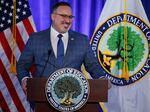
Last month, Education Secretary Miguel Cardona announced that the pause on student loan repayments would be extended once again.
Chip Somodevilla / Getty Images
The Supreme Court on Thursday put President Biden’s student loan relief program on ice for now, agreeing to hear arguments about the program in February. The court’s action means the rollout of debt cancellation will remain blocked until then.
The case will be argued in the February 2023 argument session, the court said in a brief order.
The court's order is something of a blow to the Biden administration, which had petitioned the court to allow the program to move forward while various legal challenges were considered in the lower courts. The loan forgiveness program includes up to $20,000 in loan relief for low- and middle-income borrowers.
The states’ argument
The challenge to the loan relief program was brought by a coalition of Republican-led states. Their lawsuit was initially dismissed by the district court, which said the states had not suffered an injury that would give them the right to sue. But the Eighth Circuit Court of Appeals subsequently blocked the loan forgiveness program from taking effect anywhere in the country while it considers the case.
The coalition of states challenging the program — Arkansas, Iowa, Kansas, Missouri, Nebraska, and South Carolina — argue primarily that the Department of Education does not have the right to cancel loans in these circumstances. The pandemic, the states say, is just being used as "pretext" for fulfilling the Biden administration's campaign promise to cancel debt, and they contend that in addition to being fiscally irresponsible, the program will specifically harm the states' loan authorities — state or non-profit organizations that service federal loans — by reducing their revenue.
The Biden administration’s position
The Biden administration defends the loan forgiveness program, citing in particular the Higher Education Relief Opportunities for Students Act of 2003. This authorizes the Department of Education to forgive the student loans of some borrowers who are at risk of default because of a "war, military operation, or national emergency." COVID-19, the administration argues, is a qualifying national emergency under the statute, as it was formally declared a national emergency by President Trump, and, subsequently, Education Secretary Betsy DeVos invoked the HEROES Act when pausing loan repayments early in the pandemic. The Biden administration argues that the need to mitigate the financial hardship caused by the pandemic has not gone away.
According to the government's briefs, current conditions affecting vulnerable borrowers include, among other things, "acute inflationary pressures on household budgets for 'basic necessities, including energy, food, and shelter costs.'"
Those challenging the debt relief plan respond that the HEROES Act was intended to provide relief to borrowers, particularly military personnel, who have suffered economic hardship due to a war or national-security-related issue. Moreover, they say that they administration cannot directly connect the current economic conditions in the country to the COVID-19 pandemic, and therefore cannot connect the loan relief to a national emergency at all.
Loan payments are on pause
Secretary of Education Miguel Cardona announced on Nov. 22 that the pause on student loan repayments would be extended once again, this time until 60 days after litigation surrounding the relief plan has been resolved and the Department of Education is allowed to implement the forgiveness program. If that has not occurred by June 30 of next year, repayments would begin on Aug. 29, 2023.
Mandatory loan payments have been paused since March 2020.
At least for now, Biden's student loan forgiveness program is, separately, being considered in the Fifth Circuit, on appeal of a district court decision striking down the program – the first decision to do so on the merits. On Wednesday evening, the Fifth Circuit announced it would refuse to allow the program to go forward while it considers the appeal, and it remains to be seen whether the Biden administration will challenge that decision at the Supreme Court as well, or how Thursday's Supreme Court order will affect those proceedings.
Copyright 2022 NPR. To see more, visit https://www.npr.org.
